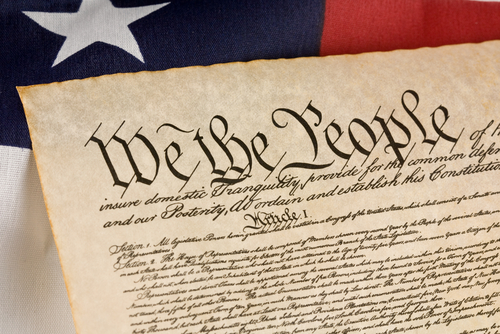According to a controversial Mormon prophecy, there will come a time when the United States Constitution will be hanging by a thread as fine as single strand of silk, and the Mormon people will step in to save the nation from destruction.
This is the infamous “white horse” prophecy, which gets trotted out every time a right-wing Mormon says or does something stupid (we’re looking at you, Ammon Bundy) or a Mormon is running for president.
It doesn’t seem to matter how often or how soundly the LDS Church has refuted the white horse prophecy as having nothing to do with Mormon founder Joseph Smith. Then-apostle Joseph Fielding Smith denounced it a century ago at the October 1918 General Conference, saying it proceeded “out of darkness, concocted in some corner,” and had not come “through the proper channels of the Church.”
Not to be outdone, his father, the prophet Joseph F. Smith, at that same meeting said the so-called prophecy was “ridiculous” and “simply false; that is all there is to it.” (For a full account of the prophecy’s spurious origins decades after the death of Joseph Smith, see this 2010 BYU Studies article.)
Yet the prophecy persists in the Mormon American imagination; we seem to love the image of ourselves as saviors who swoop in at the eleventh hour to save the nation from itself.
Clearly, I think the white horse prophecy is bogus. That doesn’t mean that every part of it is BS, however. There is a way in which Mormons can save America from itself—and with every passing year, America needs that particular kind of salvation more and more.
Let me paint a picture. Right now we live in a country in which it is entirely possible for liberals and conservatives to inhabit uprickable bubbles of their own design. Liberals get their news from CNN and MSNBC, while conservatives tune in to Fox News.
Liberals log on to their self-selecting Facebook feeds and see outrage about how the Trump administration is axing immigration, cozying up to Russia, and rolling back environmental protections. Conservatives log on to their self-selecting Facebook feeds and see outrage about terrorism, improper care of military veterans, and the fact that Trump isn’t getting more credit for job growth.
And in most of the country, these people attend religious congregations that reinforce their views. Political scientists used to think that religion drove people’s political choices. Now they’re realizing that the arrow also points in the other direction: people make their religious choices about where (and even whether) to attend based on politics, not just faith. The echo chamber doesn’t stop.
Except in Mormonism. In my life, all the aforementioned echo chambers apply: where I get my news, for example, and what my social media looks like. Even the neighborhood I live in is largely reflective of my political views, judging from the political yard signs I see come election time.
But all that goes away when I go to church, because in Mormonism I don’t have a choice about the community I belong to.
Mormons attend church based on geography, plain and simple. You don’t get to congregation-shop based on which ward has the hippest bishop or the largest youth group (though some Mormons will actually hunt around in different wards before buying a house, knowing that once they move they’ll be locked in to those ward boundaries). And you certainly don’t get to choose where to go to church based on your political tendencies.
I used to rail against this policy, especially when I moved to a rural area where I knew no one and had little in common with the long-term residents of that ward. They were Kentuckians born and bred, and I was a carpetbagger, just passing through; many hadn’t finished college, and I’d just gotten my PhD.
I was the only one with a John Kerry sticker on my car in the parking lot.
And yet in the seven years I lived there, something magical happened to me. I came to genuinely love them, and even laugh about our differences. I once pointed out to a woman in my book club that she had stenciled the Mormon lyrics “peace and plenty here abide” right on top of the gun cabinet in her family room. She laughed too. She had never considered the irony. She baked me cookies for my birthday.
Back in those days, my Mormon ward was not the only place in my life where I regularly encountered—and loved—people whose views were diametrically opposed to mine. But I would say it is now. The worlds I swim in at work are primarily academia and journalism, both of which have a particular political persuasion, and as a rule our nation has moved deeper into our own silos. As I’ve said, our online interactions nowadays tend to merely reinforce our thinking. If they don’t, we all-too-quickly unfriend one another, often in ugly ways.
As a Mormon I don’t get that option. I don’t get to excommunicate folks from my world just because they disagree with me. And I am so, so glad of it. Being forced out of my comfort zone is – well, uncomfortable. But it’s uncomfortable in an important way, as we become better in community with one another than we are when we can pretend the other side is something a little less than human.
America needs that now more than ever before. So if there is a white horse prophecy in which my religion really does swoop in to save the nation, it will surely be because of this: Mormons have not yet given up on each other, and on the possibility of life together.
Related Stories:
- How partisanship drives religious attitudes
- Mormonism at its best: The sacrament of helping people move






